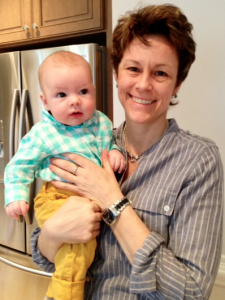This article was originally published on SFGate.com, where Peninsula Press reporter Camira Powell is an intern.

When Kelly Burke decided she wanted to have a baby, she didn’t think her pregnancy would be anything newsworthy. Like many other woman over the age of 40, Burke, 45, struggled with infertility before she was able to give birth to her son, Liam James. What makes the 45-year-old NASA research scientist’s story a little different is her choice to adopt an embryo, which also happened to be the second oldest cryopreserved human embryo in history.
Burke became a proud mother with the help of a couple in Oregon. They donated their eggs to the Reproductive Science Center of the Bay Area (RSC) 19 years ago after giving birth to a set of twins through IVF in 1994. Although the process of adopting the embryos was rigorous, Burke was able to have the embryo implanted into her body in 2012. Burke and the couple agreed upon an open adoption, meaning Liam will be able to know his siblings as he grows up.
It’s no secret that treatment of infertility is becoming commonplace as more and more women delay having children. While some doctors warn that prolonging childbirth can lead to increased risks for both mother and child, those concerns are lessening as new developments help women have safe pregnancies at any age.
Nonetheless, the ability to give birth to a healthy child with an embryo that is almost 20 years old comes as good news to some. It opens up the possibility of unused embryos going to good use. Moreover, it gives couples the option of freezing their embryos then waiting until they’re ready without the fear of an “expiration date.”
It’s too early to tell if using older embryos will become a popular choice among women who can’t use their own eggs, but it at least for Burke, it was the perfect choice.
